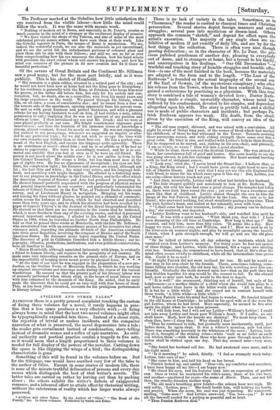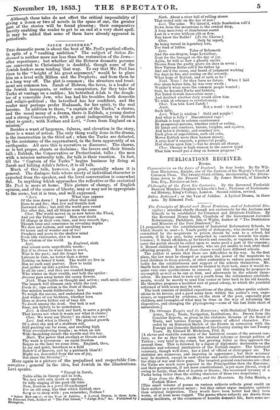AVILLION AND OTHER TALES. * Arrnotrun there is a pretty general
complaint touching the custom of fixing three volumes for a novel, it rarely happens in prac- tice that a less space produces a very effective work ;—it being always borne in mind that the best two-novel volumes might often be typographically expanded into three. Instead of a closer style, the rejection of trivial or useless incidents, and the computer narration of what is preserved, the novel degenerates into a tale; the reader gets curtailment instead of condensation, story-telling instead of dramatic scenes and a reflex of epic narrative. As criti- cal authority and poetical practice confine a tragedy to five acts, so it would seem that a length proportioned to three volumes is needed for full display of the powers of the novelist. Cutting down the space is like clipping the wings of a bird; the distinguishing characteristic is gone. Something of this will be found in the volumes before us. But for the titlepage, one would have ascribed very few of the tales to the author of Olive. 'Except in some stories.of modern life, there is none of the minute truthful delineation of persons and every-day scenes which distinguish the best of thit writer's novels. The better tales are carried on rather by lenVing out than by packing closer ; the others exhibit the writer's defects of exaggerated romance, and a laboured effort to attain effect by rhetorical writing, without the substratum of reality which her larger works always possessed.
• Avillion and other Tales. By the Author of " Olive." "The Head of the Family," &c. In three volumes. Published by Smith and Elder. There is no lack of variety in the tales. Sometimes, as in " Cleomenes," the reader is carried to classical times and Christian persecution. Several stories depict foreign manners and artist struggles ' • several pass into mysticism or dream-land. Others approach the common " sketch, and depend for effeot upon the artist's execution. The majority of any single class are ex- hibitive of modern if not exactly of daily life, and are by far the best things in the collection. There is often very nice though passing delineation ; as in the character of Mr. Le Peer, the gra_ mons polished gentleman of another day, pleasing to everybody out of doors, and to strangers at home, but a tyrant to his family, and unscrupulous in his dealings. " Our Old Dressmaker"__ truthful and touching story of humble struggles and humble affee- tion—is one of the most finished in the book, because the materials are adapted to the form and to the length. " The Last of the Ruthvens" is founded on the actual biography of the second son of the Earl of Gowrie, (of the mysterious conspiracy,) who after his release from the Tower, where he had been confined. by James, gained a subsistence by practising as a physician. With this true story is combined a tale of woman's devoted love ; Doctor Ruth- yen being made a simple, unworldly character, whose mind has suffered by his confinement, devoted to his simples, and dependent altogether upon his wife. The story is prettily told, and a skilful use is made of public characters and incidents ; but perhaps Pa- trick Ruthveri appears too weak. His death, from the shock given by the execution of the Xing, will convey an idea of the manner.
"The old man gasped, shivered, and was seized with a convulsion. All night he raved of things long past, of the scenes of blood which had marked his childhood, of those he had witnessed in the Tower. Towards morning these paroxysms ceased, and with ebbing strength there came over him a great calm. He tried to rise, and walked with Lettice's help to their fireside. But he staggered as he moved, and, sinking in his arm-chair, said piteously, am so weary, so weary !' then fell into a quiet slumber. "While he slept, there entered the Scottish Countess. She was attired in black, her countenance full of grief and horror. She came hastily to say she was going abroad, to join her unhappy mistress. Her heart seemed bursting with its load of indignant sorrow.
"'Look you,' cried she, I never loved the Stuart line : I believe that, as a King, the King erred; but I would have given my right hand to save the life of Charles Stuart. And I wish that I may yet see this vile England flow with blood, to atone for his which rests upon it this day ! But, Lettice, you are calm—these horrors touch not you ?'
"And then, mournfully, Lettice told of what bad befallen her husband.
"The lady stepped quickly and noiselessly to look at Dr. Ruthven. He still slept, but over his face had come a great change. The temples had fallen in, there were dark lines round the eyes ; yet over all was a sweetness and peace like that of childhood. Lettice almost thought she saw in him the image of the boy Patrick, her playfellow by the Cam. She said so to her friend ; who answered nothing, but stood steadfastly gazing a long time. Then she took Lattice's hand, and looked at her solemnly, even with tears.
" 'I shall come back here tomorrow, Lettice; my journey can be deferred a day,' she muttered, and departed.
"Lettice Ruthven went to her husband's side,' and watched him until be awoke. It was with a quiet smile. What think you, dear wife ? I have been dreaming of the old time at Cambridge. How long is that ago ?' She counted, and told him, more than fifty years. 'It seems like a day. How happy we were, Lettice—you, and William' and I! How we used to sit by the river-side on summer nights, and play by moonlight among the laurels. I think, when I gain strength enough, we will go and see the old place once more.'
"So he talked at intervals, -all day referring to incidents which had vanished even from Lattice's memory. For thirty years he had not spoken of these things; and Lattice, while she listened, felt a vague awe stealing over her. Something she remembered to have heard, that at life's close the mind often recurs vividly to childhood, while all the intermediate time grows dim. Could it be so now ?
"At night Patrick did not seem inclined for rest. He said he would ra-
ther stay in his arm-chair by the fireside. There, sometimes talking, some- times falling into slumber, the old man lay, his wife watching over him con- tinually. Gradually the truth dawned upon her—that on the path they had long trodden together his step would be the soonest to fail. To the eternal land, now so near unto both, he would be the first to depart.
" It is well !' she murmured, thinking not of herself, but only of his helplessness—as a mother thinks of a child whom she would fain place in a safe home rather than leave in the bitter world alone. All is hest thus. It is but for a little while.' And she ceased not to comfort herself with these words, A little while—a little while !'
"When Patrick woke his mind had begun to wander. He fancied himself in the old house at Cambridge ; he talked to his aged wife as if she were the girkLettice, whom he had loved. More especially, he seemed to live over again the night when he was taken prisoner.
"'I will hide here, but I will not see Lettice—William's Lattice! I could not take away Lettice and break poor William's heart. If I suffer, no one shall know. Hark, how the laurels are shaking ! We must keep close. I clasp thee, love—I clasp thee ! Why should I fear ? ' "Thus he continued to talk, but gradually more incoherently, until, just before dawn, he again slept. It was a winter's morning, pale but clear. There was something heavenly in the whiteness of the snow; Lettice, look- ing at it, thought of the shining robes—white 'such as no fuller on earth can whiten them '—with which those who have gone through much tribu- lation shall be clothed upon one day. That day seemed near—very near, now.
"She heard her husband call her. He had awakened once more, and 'in his right mind.- " Is it morning ?' he asked, faintly. 'I feel so strangely weak today. Lettice, take care of me.'
"She came to him, and laid his head on her breast.
"Patrick looked up' and smiled. Dear wife, my comforter and sustainer, I have been happy all my life—I am happy now.' "He closed his eyes and his features sank into an expression of perfect rest. Once or twice he murmured his wife's name, those of his two boys, and another—unuttered for years—the name of Marie. Then, and not till then the cruelly-forsaken mother wept. "The old man's breathing grew fainter—the solemn hour was nigh. He said softly, 'Lattice, pray ! ' She knelt beside him, still holding his hands, and prayed. When she arose, his soul was just departing. He whispered, 'Come soon ! ' And Lettice answered, Yes, love—yes !' It was all the farewell needed for a parting so peaceful and so brief.
"Thus Patrick Ruthven died."
Although these tales do not effect the critical impossibility of giving a dozen or two of novels in the space of one, the greater part of the stories will be found pleasing ; their comparative brevity enabling the reader to get to an end at a very short spell. It may be added that some of them have already appeared in periodicals.



































 Previous page
Previous page